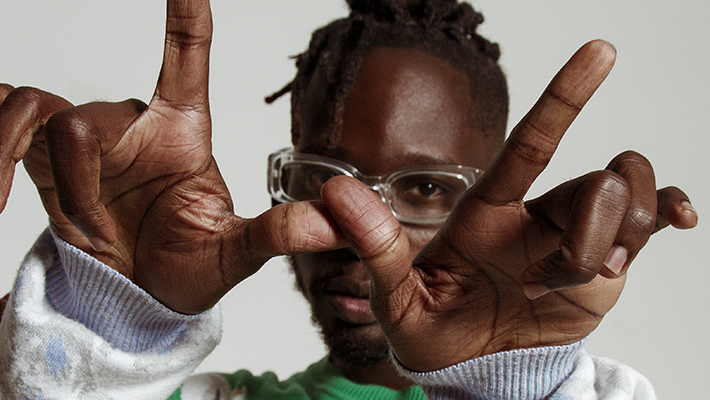The emergence of Afrobeats and Afropop has long proven to be more than a passing trend, thanks to artists like Tiwa Savage, DaVido, Burna Boy, and Wizkid. Rather, they’ve sparked a new revolution. Leading the charge is Mr Eazi. After a year of collaborations with artists like J Balvin, Nicki Minaj, and Joeboy, he is appeasing fans with his second EP, Something Else.
Out Feb. 19, the five-track project finds Eazi partly recording by himself for the first time (a result of the lockdown) and celebrates his “Banku” sound. “I spent most of my life in Nigeria, then moved to Ghana when I was 15 and [stayed there] for seven years straight,” Eazi tells Uproxx. “So Banku music is a blend of both influences. You can hear it in the four-to-the-floor drums, the sweet Nigerian chords, and then the delivery that usually switches between Ghana or Naija pidgin, Igbo and a little bit of Twi [a dialect of Ghana’s Akan language].”
Highlights on Something Else include the cheeky “Cherry” with Kenyan singer Xenia Manasseh and lead single “The Don” that embodies his signature laidback groove. “I’d been flying producers to Accra while I was there, but wasn’t recording because I’ll be so busy having meetings,” he recalls of “The Don” with a laugh. “I’d leave the house when we were supposed to be having a recording camp, come back like at 2 a.m. and go to bed. I remember [Nigerian producers Kel P and Killertunes] holding this semi-intervention: ‘Hey Eazi, you brought us here. We’ve called like three, four times. So now we’re not going to come to Accra anymore until we know that you’re actually going to record.’”
Below, Uproxx caught up with Mr Eazi about his musical growth and the next steps of his business venture.
I think it’s important the industry is finally recognizing the beauty of different African music.
A hundred percent. That’s why it’s really important for us in this position, in a time where the internet connects us, to not just create music but also structure something that’s sustainable. So beyond just dropping records and getting a bag. But learning from hip-hop, which has started becoming the sound of radio essentially. We are making pop music, but it’s always going to be looked at this new wave.
That’s why I’m passionate about African creatives owning equity in the structures. There’s a huge opportunity for the Sonys and Universals of Africa to be African-owned or to have African equity. There’s a huge opportunity in publishing, touring, and the live music agencies. As exciting as the music is, we have to be looking at all the business and making sure we push it so that it’s sustainable. I think we’re just scratching the surface right now, even with the popularity of Afrobeats or whatever you want to call it.
You also combine your sound with artists from different musical backgrounds, like a J Balvin or Major Lazer.
I don’t like to be in a box. I don’t like stereotypes. I hear, “Oh, this is how we expect African artists to sound like.” What does that mean? The reason I make music is to spread it to the world. And who is introducing something to you is very important. If you were walking on the road and somebody tries to introduce you to something, your first reaction might be to suspect it. If it was somebody you knew, then the possibility of you accepting it is way higher.
So when you see me on records with J Balvin, I’m sharing my culture and introducing my sound to his audience. They follow the breadcrumbs and it opens them to this whole new world of African music. It makes the conversation even bigger. My fans know that Mr. Eazi is always on a journey and that includes listening to music that might seem experimental. They may say, “We don’t know what is happening here. But we know it’s good music.”
But I didn’t just start making music with J Balvin. I first went to Spain for [the Sonar festival]. I saw so much good music and culture from the artists that were performing. It was absolutely insane, so I ended up listening to a bunch of Latin American artists. I went out to Cuba and was hearing sounds that I thought I had heard in West Africa. I was like, “Who’s stealing whose sound? (laughs)
I think that’s why it works so well because the basis of reggaetón and Afrobeats is similar.
Yeah, and the groove! A lot of my fans don’t know that this world exists. Not because they don’t have access to it, just ‘cause they’ve not finished exploring Afrobeats. I feel that’s my role: to build bridges between different cultures and introduce my fans to that. It doesn’t mean because I’m an African artist that my song must have specific kinds of drums. I can make classical music if I want and I’ll still sound authentic.
It’s nice to see people who came from the motherland and dispersed in the Caribbean, Africa, London, and New York collaborate. But I want to get your thoughts on this because I’ve noticed the Twitter topic of dancehall leans more towards African artists rather than Jamaican ones.
If you listen to African and Jamaican dancehall, you have to be a zombie to not be able to tell the difference. In Ghana right now, there’s drill music that everybody goes crazy to. It’s not UK drill. It’s not Pop Smoke. It’s these guys called the Kumericans: boys from Kumasi [a city in Ghana] that are doing drill in their local language. So it really depends on where you are. Obviously, you cannot deny where the inspiration comes from. I feel like the top-tier artists are always vocal about mentioning Bounty Killa, Popcaan, or Beenie Man. Even I have been inspired by Beenie Man. Actually, you see Jamaican artists coming to Ghana. Two years ago, I brought Kranium and Koffee.
You collaborated with Kranium on Walshy Fire’s “Call Me” track two years ago.
Exactly. So I don’t think there’s any purposeful disrespect, I think both are existing in their own unique spaces. Jamaican dancehall, unquestionably, always has been driving culture and influencing people from different genres. Same as reggae. You had Lucky Dube in South Africa making reggae that was very personal to the people going through apartheid. If you think about it deeply, you would see that we’re all Africans making music that we can relate to because somewhere inside the DNA of dancehall or reggae, I also have the same DNA because we are all brothers and sisters.
Of course, there’ll be some fans who like to make banter and say one is better than the other. Just like in a match of football. Some may say Manchester City is better than Liverpool. In this terms of music, I think there’s mutual respect, at least on this side of the world. But even when I went to Jamaica to perform with Chronixx and Reggae Sumfest 2019, I could still see the respect.
Your emPawa Africa talent incubator also helps to unite the diaspora. What have you learned about the business side of the music industry?
Four years ago today, I put out my song “Accra To Lagos.” In those four years, I’ve been independent. The more I learn, I realize that it’s essentially the same thing as if I was selling milk. Because at the end of the day, you still have raw materials and putting everything together into this awesome product, and then you’re sharing it with the world. Music is different in the sense that it’s a more sentimental product.
It’s just buying and selling. I always say it’s not rocket science. You have to protect the brand, you have to advertise. That’s why Coca-Cola is so big, they’re still rebranding. When I’m in meetings where people are trying to overcomplicate things, I’m like, “Hey, this is not that deep.” (laughs)
You give me an advance, it’s like invoice financing. You’re basically saying, “Take this money right now. I have a feeling that you would make it in the future.” So when I sign an artist and I give them funds, I’m hedging on the fact that the artist is going to make that money back. Then I’m taking the masters or the license for a period of time as collateral. I know that I have the infrastructure to help the artist grow, to mentor them, to put them on TV, et cetera. And we break bread. So that “one plus one equals two” in any business, that’s the same mindset that I bring to the music.
As you grow as a label boss, what are some goals that you want to accomplish?
I’m obsessed with the idea of breaking new artists. I signed an artist last year from the Northern part of Nigeria. Just for context, it’s like the most populous in terms of density. They speak Hausa. I think over 50 million people across Africa speak Hausa. But it just seems like the North is musically disconnected from the West and the East. So for me, I took it as a challenge to sign an artist from there. His name is Namenj. I’m giving him that same quality and the same kind of producers that I work with myself. The idea is to break him into what will be the first Hausa popstar out of Nigeria. They already call [the sound] “Arewa pop.” I’m sure it’s not on any major publication’s radar yet, but very soon.
Well, we have it in this interview now!
Yes exactly. (laughs) There’s also like 200 million people who speak Swahili, right? One of the biggest artists out of Africa, who a lot of people don’t talk about, is Diamond Platnumz. He’s not only the biggest artist in Tanzania, but he has his own label and stakes in radio and TV stations.
He just collaborated with Alicia Keys on her new album.
Yes, but there’s also still a disconnect where anything happening in East Africa just stays in East Africa. It never comes to the West. So we just started working with a female artist called Nandy. The goal is to take her story and try to amalgamate what’s happening in the West with what’s happening in the East to make it a bigger conversation. So between that and working on my album this year, that’s where my head is.
Something Else EP is out Friday via Banku Music. Get it here.





